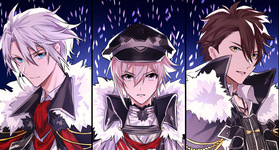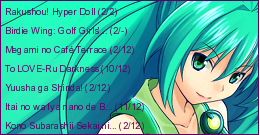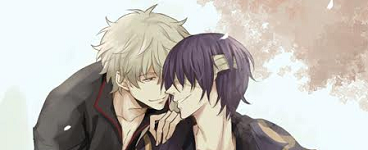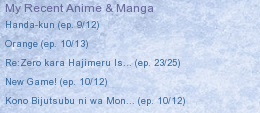New
What did you think of this episode?
DO NOT discuss the source material beyond this episode. If you want to discuss future events or theories, please use separate threads.
DO NOT ask where to watch/download this episode or give links to copyrighted, non-fair use material.
DO NOT troll/bait/harass/abuse other users for liking or disliking the series/characters.
DO read the Anime Discussion Rules and Site & Forum Guidelines.
DO NOT ask where to watch/download this episode or give links to copyrighted, non-fair use material.
DO NOT troll/bait/harass/abuse other users for liking or disliking the series/characters.
DO read the Anime Discussion Rules and Site & Forum Guidelines.
Oct 31, 2013 9:15 PM
#51
| i liked how it touched on censorship and how people want someone to tell them whats right or wrong. i enjoyed this ep but there were a few things i did not understand clearly. 1 the author 2 and why critics were saying all the books were harmful if they were comprised of people who loved books, they said that some of the people from the underground were captured and im guessing that they were the critics but what made them think most books are harmful? if you guys have a different idea please let me know. |
 |
Nov 12, 2013 3:16 PM
#52
| am i the only one who saw this episode and jumped out of my bed screaming "SHUTTER ISLAND"!!! both this episode and that movie have similar themes...a man who is a mental patient, thinks he is in a scenario where he is a part of something huge against he system but is really undergoing an elaborate treatment? also i checked..the book shutter island was published on april 15th 2003 and this episode was released on 10th june of the same year.....now could it just be that the writers of this show decided to borrow a little idea...hmmmm..... *mindblown* |
Nov 13, 2013 9:22 AM
#53
| By far my least favorite episode so far. It's perhaps unusually ambitious in trying to address the influence of fiction outside of its own bounds in so many ways, for example how it effects our identity and society, but it lacks a point, and a conclusion. Usually Kino will eventually, often despite herself, be forced to take a side, but here, first we're lead to believe it's some kind of totalitarian society, and there's a resistance movement. Then late in the episode we suddenly learn the resistance movement is some kind of setup to convince a person who can't seperate reality from fiction to voluntarily turn himself over to the hospital, and that the people in the hospital actually love books, and the patients are made to be critics, and decide which books are to be read by the people and not. But why are they then keeping the books to themselves? Why would the readers, upon being hospitalized, harass their own kind? And then all of a sudden all of the books are on fire. Oh, I think I actually see now. It's an analogy. Children's books and useful books are usually safe from criticism. On the other hand, we have the elitist critics in their ivory towers, telling people what's good literature, and not, based on complicated measures, alien to most people. So I guess the episode is a kind of depiction of the ironic tragedy that is that the more you love books, or any kind of art, the harsher you are towards it. And on that note, the episode is no doubt a big, tangled muddle, and the random thing with the tank, and the seemingly meaningless choice to make it a story Kino reads instead of an actual visit to such a place, perhaps to reflect the episode's themes, don't help much. I understand this anime is based on a book, so perhaps, with more than 20 minutes at disposal, there was more space to tell the story more clearly, and it was better, but yes, not the series best episode, no, but perhaps one of the most interesting ones, after all. |
Nov 13, 2013 5:45 PM
#54
| wow..... and i thought i liked books D: went slightly weird towards the end tbh aha |
Dec 24, 2013 12:25 AM
#55
| book crazy people ive met plenty in real life and they are similar to the ones in this episode |
Jan 1, 2014 2:34 AM
#56
| I felt as if parts of this episode was the actual author of the Kino books having a bit of a dig at critics lol. |
Apr 1, 2014 7:47 PM
#58
| My goodness...that scene with "Kino" on the bed wearing the auto-reading device. What if everything's just a story and everything exists only in her head O__O I understood (I think) the other issues but that scene was what really stuck out to me. I think my entire view of this series has completely changed. |
"May those who accept their fate be granted happiness." "May those who defy their fate be granted glory." |
Apr 5, 2014 2:07 AM
#59
xchee said: My goodness...that scene with "Kino" on the bed wearing the auto-reading device. What if everything's just a story and everything exists only in her head O__O I understood (I think) the other issues but that scene was what really stuck out to me. I think my entire view of this series has completely changed. Nah they just put that there to screw with ya... putting that little thought of "maybe this is all just a dream" in your head. Not something to pay any attention to, not to mentioned it was pretty half assed. |
Apr 26, 2014 5:23 PM
#60
| Hi there, just dropping in to share my interpretation. Writing it down like this really helps me organize my own thoughts on the matter. I noticed two parallel messages during the story. On the one hand, we had two parties vying against each other: the critics and the resistance. The resistance represents what happens when one is subject to censorship. When something is denied to a person, they want it all the more. The irony is that the critics were former resistance members. This means that our impulse to obtain that which is denied to us is driven primarily by the freedom to access it rather than actually possess the object itself. Once a critic, they remained, as they had been while members of the resistance, obsessed with the power of expressing that freedom (criticizing) rather than enjoying the books they had long-desired. However, their judgment was ultimately flawed, because their opinions were limited by being subjective, while creativity and imagination are unlimited in their breadth. Thus, at face value, the moral of the episode is a message on censorship, that those in authority are incapable of determining for everyone what media they can access, and that people denied it will only work all the harder for it. Yet we have left out a few details of the story, primarily regarding the existence of the author, the significance of the traveler (who had read all the books) abandoning the town, and the book of empty pages seen at the end. These details lead us to what I believe to be the underlying, more personal message of the episode. It's a message of true freedom gained by individual autonomy. I mentioned above that the resistance desired above all the freedom to choose, but when they had that freedom as critics, they were still shackled by their original obsession of having the power of freedom, so they abused the freedom by judging all the books for everyone instead of reading them for their personal benefit. This resulted in censorship and propelled the perpetual cycle of resistance -> critics -> censorship -> create more resistance -> more critics -> more resistance and so on and so forth. The only ones who escaped this vicious cycle were the ones who had emancipated themselves from this obsession with power, the author and the traveler. They recognized the true value of books lay in their potential to inspire your imagination. This is why they said the critics could never adequately judge a book, because everyone will be inspired by the book differently. The moral lesson is that true power comes from within; you should not be bound by a need to have power (resistance) or prove you have power over others (critics). Freed of the obsession for power, you stop struggling senselessly and become content with the power within oneself. Hence, the author wrote a book of blank pages and the traveler left the city to wander the world, because they realized their life didn't need to revolve around this struggle for power; they had that power all along within themselves to imagine their own stories. The books are just a symbol of our struggle to establish our own authority in life for ourselves or in the face of our peers, but that in reality one becomes truly content when they realize they don't need to fight over anything for its symbolic significance, for they are things that come from within and can never be taken from you. The fire at the end removed the source of the power, so there was nothing else for anyone to fight over. This is a reminder to us viewers of the extent to which the lives of the characters revolved around the books, contrasted in the end with a book of blank pages and a short story of a tank that showed they never actually needed the books in the first place, the imagination (power within) resided in everyone. |
Ilike69Apr 26, 2014 5:37 PM
May 6, 2014 1:12 PM
#61
| So rather than plunging into the merits and demerits of censorship of ideas in particular, it's not so much a regime bent on controlling society by containing ideas potent enough to topple governments as it is about fiction's effect on people. The issue of escapism comes to mind, how enough interest produces illusory worlds steadily indistinguishable from reality, obsessive attachments towards these worlds, and egoism resulting from being privy to them. You have your two extremes: critics who attack which deviates from their subjective realities, and consumers, so full of their own subjective realities that they overly about them when they are attacked. To the literature that are neutral, that'll offend neither party, it apparently amounts to nothing else save children's books and how-to manuals. And then you have the mysterious author, who claims that everything in the world that you could possibly want in a story is all in a book he wrote, which, opened, has nothing written. Of course, one could simply interpret this as the world being a whole lot of nothing. But that might be the point. You could say that objectively, the world has no meaning, just as sea shells may be worth money, or beauty, or nothing to different people in different places, suggesting that value is authored. But does the fact that its authored matter? After all, free will willing, people are the authors of their own stories. We are not to make fiction reality, because that implies some objective, universal value where there is none. Instead, we are to make our personal realities fiction. In addition, books are great things, but they are not good ones. |
Jun 20, 2014 11:33 PM
#62
| Best episode so far. i think the message that the author wanted to provide is that how harm books can be.. there are people who can't tell the difference between reality and fantasy. and it's really true, books, video games, anime all can have a harmful negative effect on the reader. masterpiece episode! 5/5 |
Aug 3, 2014 5:51 AM
#63
| I felt like I'm a traveler watching this. Don't make me become a critic please. |
Aug 10, 2014 5:11 PM
#64
insan3Spectre said: Interesting episode about censorship and it's possible good or bad points. It's true that the people who read the books took it a little to literally, but I believe that that is their right. I also like how the episode took a stab at critics. |
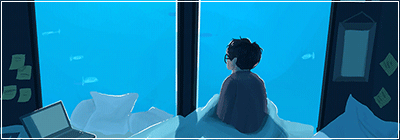 |
Aug 23, 2014 10:43 PM
#65
| First episode of Kino's Journey I didn't like and by far the most difficult one to grasp. It ended up being so confusing that it wasn't even fun to watch cause I couldn't even tell what was real and what was fake though I guess that was just the theme of the episode. 3/5 |
FunnyRatmanAug 23, 2014 10:49 PM
Dec 6, 2014 8:54 AM
#66
| This is a brilliant meditation of fiction's effect on people. The episode demonstrates how fiction can be used escapism, but doesn't try to make a point of if this good or bad. On one hand, fiction can be damaging if it is confused with reality, but at the same time it can provide solitude from a harsh reality. The episode also has some interesting things to say about criticism of fiction, and mindless consumption of fiction. Just an amazing episode. |
| Laugh and the world laughs with you. Weep and you weep alone. |
Dec 9, 2014 12:27 AM
#67
| most mind rape episode of all was making connections all the way through consciously felt like they could make the point clearer |
Feb 24, 2015 9:04 AM
#68
Adramelech said: It was about how the reality can be extremely subjective, from one's point of view. They showed this fact from various point of views you see: Author, followers of the Author, Critics, President, Kino being a disabled girl who is just imagining this whole story and most importantly the tank which cannot see itself. This episode, of course, was not about animes and games getting banned :) It is just a shallow way to interpret this episode I think. And of course, the breucratical structure, yes. You cannot prove anything about the reality except yourselves being an entity. while reading the other posts, i was surprised no one really picked up on this. this is what the episode is really about. additionally, i think the episode critiques the human psyche moreso than society as a whole. particularly, the part of human psyche that wants to have a romanticized life (as the main character) as well as an authority over the life they live (as the author). most of the characters in the episode wanted to be a "main character", when in fact they should have focused on being "authors", like the man who left the country. |
astroneetFeb 24, 2015 9:17 AM
Apr 7, 2015 7:10 AM
#69
| I think the number of different interpretations this has gotten proves that the episode (in this thread) proves that it's quite good, lol. Certainly, a very complex episode. Seems quite relevant to MAL to, since the critics vs normals presented are essentially a parallel to the elitist vs casual conflicts we have. Of course, this series goes to show that neither side is truly correct. |
Apr 20, 2015 11:21 AM
#70
| I can never look at interpretations the same again after the third episode and it just continues to show how every one of us interprets things differently. Despite the other comments about the censorship and critiquing, I think this episode was more of a personal note for the author itself than a message for the audience. Why I think that you ask? Well, often times when authors are writing characters they get into them, that they can lose the sense of reality because they're so much into the character building, thus why the author in this episode was saying that Kino was visiting a world in her fantasy. Same thing applies to actors who get much into the character that they need to play, see Heath Ledger for example. However, it might not be the correct interpretation, as the other people's interpretations are quite interesting to read as well. :) |
 |
May 11, 2015 10:52 AM
#71
| My thoughts match up with the post I made the last time I watched this episode, the main theme I took from this episode is how reality can never be defined with complete certainty as each person contributes an incomplete interpretation of it to form the bigger picture. I got a real good laugh with the author, he said some thought provoking things but the way he got written off as a nutcase on the run was a hoot. I could appreciate the critics part now that I've spent more time on MAL and have seen many posts that could be chalked up to that role. |
May 14, 2015 3:30 AM
#72
Shinryuken said: wow this episode... probably the best so far didnt excpect it to take a psychological turn I agree. This was such a brilliant episode. I see it being far more about ego and the idea of self (with some bits concerning the concept of god and fate) than the dangers of stories and being trapped in fantasy. This was very interesting. |
Jun 26, 2015 3:11 PM
#73
| So thought provoking! The question of reality, your own existence and dont forget censorship. Definitely interesting seeing Kino there in a post apoc world lying in a bed, living in her favourite book. For me this episode really was more about the existence of one-self and reality as a whole though. |
Aug 10, 2015 11:46 AM
#74
| I didn't like the ending that much. Maybe I just missed something, but it feels like a real cop-out. Ultimately, the themes are interesting, but scattered. (...Am I becoming one of those critics?) But wow, that scene where Kino and Hermes meet the author: "There is a book about a traveler visiting countries on a motorrad. And while reading that book, you become that character; believe that it is you on those pages. You see the land and feel the breeze, don't you?" I feel like this whole show was worth it for those few lines alone. Really freaked me out a little, too. |
Aug 18, 2015 2:52 AM
#75
| Wow, I came in here expecting everyone to say how much they liked this episode but it seems people are split on it. I, personally, thought it was one of the better ones and liked it a lot. |
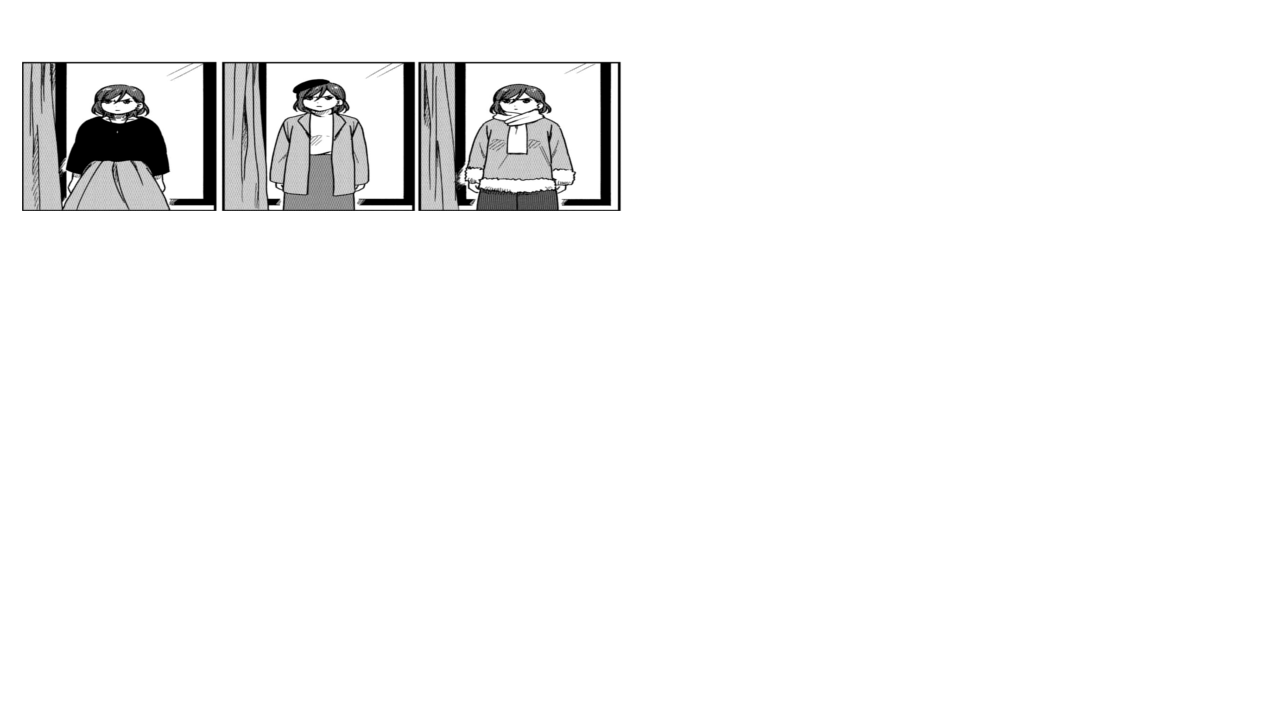 |
Nov 21, 2015 2:26 AM
#77
dug said: I didn't like the ending that much. Maybe I just missed something, but it feels like a real cop-out. Ultimately, the themes are interesting, but scattered. (...Am I becoming one of those critics?) But wow, that scene where Kino and Hermes meet the author: "There is a book about a traveler visiting countries on a motorrad. And while reading that book, you become that character; believe that it is you on those pages. You see the land and feel the breeze, don't you?" I feel like this whole show was worth it for those few lines alone. Really freaked me out a little, too. Pretty much agree with this. I feel this idea had a lot of potential but wasted it in the end. Could end up being the difference between a 9 and 10 on this show for me. The "critics" reminded me of MAL though, which was a highlight lol. |
 |
Dec 6, 2015 10:36 PM
#78
Feb 15, 2016 8:14 PM
#79
| This episode was probably even better in the novels because it adds that extra layer, where YOU are being sucked into the book and getting absorbed into a fake story. Still loved it though, I can see where the writer was going with this. The "book of everything" was also awesome. |
| ~ The world is not beautiful, therefore it is. |
May 23, 2016 8:01 AM
#80
| I liked how each character in the country was a mirror to what the author said about one's life. I also liked how they purposefully broke the fourth wall. Not like other shows do it. Yes, they showed that Kino no Tabi was a work of fiction and Kino+Hermes were thinking about that stuff but it also grabbed the whole notion of the episode - what is reality and what is fiction/fantasy - and intertwined it with the break of the fourth wall by creating more fiction that contained a fictional story about Kino that was read by Kino in said story. wow yeah, lol PSI-Gale said: i liked how it touched on censorship and how people want someone to tell them whats right or wrong. i enjoyed this ep but there were a few things i did not understand clearly. 1 the author 2 and why critics were saying all the books were harmful if they were comprised of people who loved books, they said that some of the people from the underground were captured and im guessing that they were the critics but what made them think most books are harmful? if you guys have a different idea please let me know. It's just a theory but I think you can explain it by what the minister said. She said something along the lines of: "Look at their smug faces when they do the critiques. They love to ruin other peoples lives." I think it plays on the human nature of greed, which was also mentioned this episode. Those critics love those books and are fanatics. They are in the position where they have enough power to chose what other peoples can read. They probably want to keep the best works of fiction for themselves. |
MirageeOct 10, 2016 1:58 PM
 |
Jun 5, 2016 8:39 PM
#81
Oct 6, 2016 5:37 PM
#82
bellellis said: So I guess the episode is a kind of depiction of the ironic tragedy that is that the more you love books, or any kind of art, the harsher you are towards it. That is one interesting point of this episode. Aside of that, it centered around Reality vs Fiction, and going deeper, around Identity/Consciousness. A quite psychological episode (additional to the usual Philosophy), and a lot packed in 20 minutes, so it's unsurprising that many felt lost. Still, I think it's worth the time to spend some additional time trying to pick this one apart, maybe watch it a second time. One thing that makes this episode really good: One of its themes is how subjective our experience is, and the episode was created in a way that makes is quite subjective to interpretation. (Similar to Perfect Blue, as someone mentioned). Oh, and the tank: I think that's another part of showing how subjective life and the meaning we give it can be. This 'tank' stayed alive because it was searching for one specific tank as it's last task, never realizing that the description actually fits itself. So basically this tank stayed alive because it was (unsuccessfully) chasing itself. |
Oct 10, 2016 1:30 PM
#83
| Man, that was one tight episode. And also, this thread is almost as interesting as the episode itself, as I can read all of your different interpretations of the episode. |
Nov 6, 2016 11:08 AM
#84
| Well, so far I'm loving the show (Eps 1-3-4-8 were off the charts) and so far this episode was the most cryptic (and badly structured as well maybe? some seriously underdeveloped stuff imho) along with ep. 5 (the railroad men episode). I'll just write what I got from the episode down to put some order in my mind. This one has been a bit trickier to crack compared to the other ones. Basically the whole point of the committee (and subsequently, their plan to have "The Author" arrested) was to avoid people getting too involved in book stories, but that's just what happens. The resistance fighters are well aware that they are just role playing, but in the end they actually fight against the critics and become one as MCs with the story weaved by the president of the committee. (Sidenote! Yet another ironic statement that this show is so keen on takes place here. Fighting to keep people from being drawn into fantasy but ultimately succumbing to fantasy itself. Brilliant, up there with the railroad workers episode) But the Author figured out he was getting duped and so, being the god of the world he thinks he wrote, he destroys it, and burns the whole castle and everyone with him. He basically took the notion of "being obsessed and identifying with a book story" to a whole new level: he thought reality was a story in which he was to be the MC, but dissatisfied, wanted to get out of his role and become the author. If the books I read seem so real, and I can literally dive in and live them, who's to say that this place and time (i.e. the real world) I'm currently immersed in is not a book itself? As always, this show takes a concept to its extremes and makes a great, ironic commentary on it: the author is a warning to everyone who takes their books too seriously. And hey! The "book about the whole world" which had nothing written on it? I just think that it means everyone has to shape his reality and become the author of it, just like "The Author" did. "Classification of fantasy and reality is a fantasy in itself that humans have created": he is considering life as a big fantastic story we're whipping up as we go. Onto the poorly developed section of the episode. The concept of "criticism harsher than necessary" and "the pleasure of reading books to carry in your heart" are underdeveloped, and don't exactly end up anywhere, as they're brought up and finalized in a minute or so. This was probably the section of the light novel that suffered the most from an anime adaptation. Also, when the minister of reading welfare seems so excited and bound to books, I think it's implied that she likes to let herself loose in fictional universes. Nobody would "carry in their heart" a book about gardening or stuff like that, right? And what statement does the episode make, exactly? I can't tell if it's saying if censorship is right or not, to be honest. I think it's just showing different perspectives of how people deal with getting immersed in books. On one side the resistance fighters lose their identity by sinking into a role which is by all means NOT what they are in real life, on another The Author skips this, he sort of gets immersed in another way, and finds his identity as the author of his book. Nice. |
umusNov 6, 2016 11:58 AM
Nov 20, 2016 10:05 PM
#85
Dec 18, 2016 5:35 AM
#86
| I liked how they portrayed censorship. Though the episode was complicated and not everything was clear at the end, some lines were gold. Great Episode. |
Mar 31, 2017 10:30 AM
#87
| Honestly, this episode was more of an 'idea dump' (if I dare say) of the author of the light novels for his thoughts and feelings on books and fiction. I don't think any of the ideas that were mentioned in this thread can actually act as a central theme for this episode because I believe, it lacks one. All the thematic concepts and ideas this episode had just all seemed clumped together, none of them actually developed into points, something beyond just ideas. That's why the narrative seems so jumbled up. There has to be a situation for each idea to come up, and to express all these ideas, you need quite a number of situations to take place. How exactly do you clearly present all these situations in twenty minutes? That's why it just seems so messy. I've counted five themes this episode tried to present. Although that might not seem like a lot, each idea is fairly heavy and would take quite a lot more development to unpack everything each idea has to offer than this episode has given them. 1. The good ol' classic "Some/most/a considerable portion of fiction must be censored because they contain dangerous and radical ideas and because they cause people to be disconnected from reality." 2. To lead-in from the previous idea, "Fiction can cause people to be disconnected from reality." 3. And to lead in from THAT idea, "What if we are actually within a piece of fiction ourselves and we are too disconnected from reality to notice?" 4. "Critique of fiction is mere pretension and only harms other people's enjoyment of the fiction." 5. Lastly, touched upon vaguely by Kino in the ending, "Writing is a genuine way of life people can live by." (This one, I'm not very sure of. It certainly felt like it was what the ending was implying as it also matches up pretty well with one of the main themes of the show and previous themes from previous episodes.) The problem I believe this episode had was that although it was leading the viewer through ideas one to three fairly well, when the Castle is then entered, it completely ditches these ideas then jumps to these next ones before those first three concepts ever got developed enough to have points. EDIT: dem floating existentialist tanks tho |
Jaguar-chanSep 8, 2018 2:33 AM
| "There’s no point in the world. But isn’t that wonderful? Because if there isn’t one, then you can decide what it is for yourself." ~ Filicia Heideman, Sora no Woto "Senpai...please grow up." ~ Fumi Manjoume, Aoi Hana "I wonder what tomorrow will bring." ~ Yunocchi, Hidamari Sketch: Sae and Hiro's Graduation Arc |
Jul 1, 2017 5:25 AM
#88
| Sometimes I really don't understand this anime xD I guess everyone are "crazy" about the books, including the minister Then Joker come in and burnt all monies the books are gone In the end what's the "Tank" story purpose? In the beginning Kino said it's a "story" from book but they met each other in the end? |
"Signature removed" 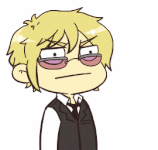 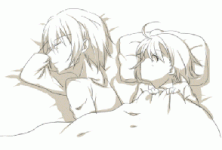 |
Aug 2, 2017 5:11 AM
#89
| This episode was probably the most thought provoking in terms of themes. But a bit overloaded and the connection wasn't clear enough imo. Think the rewatch value is extremely high here and I'm definitely gonna do so. |
One Piece episode 914 & 915 & 1027 were a mistake and 957 brought the salvation - FMmatron |
Aug 29, 2017 10:19 AM
#90
| Critics ruining the enjoyment, ayyy. |
 |
Sep 6, 2017 4:32 AM
#91
| I didn't enjoy this one very much, possibly because the themes don't really appeal to me. |
Sep 7, 2017 8:54 PM
#92
baka1Q48 said: am i the only one who saw this episode and jumped out of my bed screaming "SHUTTER ISLAND"!!! both this episode and that movie have similar themes...a man who is a mental patient, thinks he is in a scenario where he is a part of something huge against he system but is really undergoing an elaborate treatment? The 1920 German Expressionist silent film, The Cabinet of Dr. Caligari, had a similar ending plot twist. Everyone who enjoyed this episode should watch that. For that matter, everyone who likes Kino in general should watch it; it's more broadly appealing and better put-together than this episode. It's on YouTube. https://www.youtube.com/watch?v=BuocVLKdSqQ https://en.wikipedia.org/wiki/The_Cabinet_of_Dr._Caligari http://thefilmexperience.net/blog/2011/3/24/distant-relatives-the-cabinet-of-dr-caligari-and-shutter-isl.html http://screenprism.com/insights/article/why-is-the-cabinet-of-dr.-caligari-considered-the-definitive-german-express Roger Ebert says, "Caligari is said to be the first example in cinema of German Expressionism, a visual style in which not only the characters but the world itself is out of joint.” The film was written by Hans Janowitz and Carl Mayer, both of whom were reportedly embittered by the military and distrustful of authority after World War I. The film reflects their sentiments, depicting an authority that is brutal and insane, manipulating those under its observation to their own whim. The somnambulist character of Cesare (Conrad Veidt) is to be viewed as a soldier carrying out orders without any say in the matter. This, of course, was a premonition that echoed the behaviors of German soldiers over the decades that followed. Germany was largely isolated from the rest of the world following the first World War. Expressionism therefore became confined to the country, and refers to a number of creative movements from WWI through the 1920s. Expressionist works examined the current and future state of the culture through bold and artistic expressions of creativity, and often explored topics of madness, betrayal, and other intellectual concepts. Nothing encapsulates all these ideas more than The Cabinet of Dr. Caligari. As German filmmakers and artists emigrated from the country over time, their work influenced art in other parts of the world. The expressionist movement was well in swing in other artistic mediums when it moved into the art of film. Now, almost a century later, Dr. Caligari is often cited as the cinematic height of the movement. nep-nep said: I think the number of different interpretations this has gotten proves that the episode (in this thread) proves that it's quite good, lol. Certainly, a very complex episode. I'd say it may support any or all of the following: 1) That people want to understand it 2) That people want to think they understand it 3) That people want to believe that it's good: a) because they liked Kino's Journey up to this point b) because the critics in the castle have determined that Kino's Journey is one of the best anime That said, far be it from me to even wish to "ruin other people's pleasure," in the words of the Minister of the Department of Reading and Welfare. My policy and mantra is that negative criticism can potentially offer value to a work's fans only if it comes with a suggestion of a work that is similar, but perhaps more rewarding. (Personally, I found Caligari more rewarding, but it didn't contain all the different ideas that were crammed into this episode. My favorite post in this thread is #87 just above, by @Jaguar-chan.) Regarding 3b: Just as negative criticism can "ruin other people's pleasure" of the work being criticized, the same effect can result from overly authoritarian elevation of critically acclaimed great works. I've seen a man claim that 10/10 scores should be given only to shows such as Evangelion, Cowboy Bebop, LOGH, etc. and that ranking mere personal favorites the same as or higher than those is unacceptable. That is another way critics can "ruin other people's pleasure." I sat through Shutter Island twice, determined to enjoy it as much as I could. I never could force myself to like it. I watched The Dark Knight three times, in hope that I'd enjoy it like my friends at film school did. I never could. Kino's Journey is good, and this episode is clearly valuable because I believe the people who say they enjoyed it, but I hope no one tries to force themselves to like it. Ah, what have I done? I didn't want to fall down such a meta rabbit hole, I didn't even have anything to say about this episode. I just thought the suggestion that "the number of different interpretations this has gotten (...) proves that it's quite good" might be worth discussing, haha. |
nDroaeSep 8, 2017 2:38 PM
Sep 27, 2017 7:36 AM
#93
| The minister of welfare just insulted elitists/"critics" XD |
Oct 11, 2017 10:10 AM
#94
| What an interesting and meta episode. I honestly believed at a certain point. We were going to get some crazy twist that Kino was a bed ridden lonely kid. Who was just like reading post apocalyptic novels to escape from her miserable everyday life. Although much like SPOILERS the ending of Danganronpa V3. I suppose it wouldn't make too much of a difference if that was the case. The story we've been following is more important than its context. The bookphobic society felt very Bradbury to me. But also like a meta commentary on how obsessed with light novels otaku get. It was one of those interesting episodes where who was right and wrong is never made all that clear. The Resistance do spend too much of their life fantasizing about books. But the government are tyrannical in their own way. Forcing their limited perspective of being a reader on the whole population. The whole critic thing was kind of hard to unpack. On the one hand it seemed like a light novel author taking a dig at critics as the lowest of the low. But on the other the bureaucrats dismissal of them felt a little tongue in cheek. And indicative of the bureaucracies short comings. This was such a wild ride of an episode. I was almost relieved to see the bookshelves just start burning at the end. Ultimately while I think it's some Mike Teavee in Willy Wonka style hypocritical preaching. I have to agree with the one dude at the beginning. If it's going to get this complicated. I'd rather just take off into the desert. |
Oct 14, 2017 3:33 AM
#95
Don1Joker said: Best episode so far. i think the message that the author wanted to provide is that how harm books can be.. there are people who can't tell the difference between reality and fantasy. and it's really true, books, video games, anime all can have a harmful negative effect on the reader. masterpiece episode! 5/5 It's... not that. More like, how we let the books affect ourselves depends more on how "we" take them rather than the contents of the books themselves. |
Dec 27, 2017 7:53 PM
#96
| oh no a place that has some people blindly follow critics even if they are no different from you and me. This must be the internet. ok umm what? So is everyone bat shit crazy in this town and is it all make believe. |
Mar 31, 2018 8:15 PM
#97
| whoa that was trippy loved that part tho the fahrenheit 1984 society not so much |
| "I like young-girl sexual creations, Lolicon is just one hobby of my many hobbies," he says. I ask what his wife, standing nearby, thinks of his "hobby". "She probably thinks no problem," he replies. "Because she loves young boys sexually interacting with each other." |
May 1, 2018 10:27 PM
#98
| This episode makes much more sense if you think about it being adapted from the light novel. I appreciate the author's self-deprecating humor. I am convinced now that this series deserves the acclaim I always see. It doesn't seem like a lot of people understand the philosophical allegory in this story though. |
| Signature removed. Please follow the signature rules, as defined in the Site & Forum Guidelines. |
Aug 10, 2018 5:42 AM
#99
More topics from this board
Poll: » Kino's Journey Episode 6 Discussion ( 1 2 )cyruz - Jul 12, 2008 |
85 |
by paul1990xco
»»
Apr 9, 6:05 AM |
|
Poll: » Kino's Journey Episode 10 Discussion ( 1 2 )cyruz - Jul 16, 2008 |
98 |
by Ratris_Decision
»»
Jan 13, 7:14 AM |
|
Poll: » Kino's Journey Episode 4 Discussion ( 1 2 3 4 )cyruz - Jul 10, 2008 |
152 |
by 2life
»»
Jan 9, 5:45 PM |
|
Poll: » Kino's Journey Episode 1 Discussion ( 1 2 3 )cyruz - Jul 8, 2008 |
121 |
by Ratris_Decision
»»
Jan 7, 6:39 AM |
|
Poll: » Kino's Journey Episode 13 Discussion ( 1 2 3 4 )cyruz - Jul 29, 2008 |
197 |
by Toueki
»»
Nov 27, 2023 9:31 PM |

